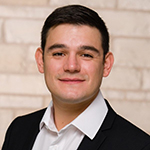Exploring Renewable Energy Opportunities
Joshua Pascal (MSES '23) spent five years as a product manager at a medical equipment manufacturing company when he decided he wanted a new challenge. He was interested in sustainability, and he thought with some additional education, he could play a significant part in combating climate change.
Pascal explored a variety of graduate programs. He considered an advanced degree in engineering or an MBA, but then he discovered Northwestern's Master of Science in Energy and Sustainability (MSES) program, a joint offering by Northwestern Engineering and the Paula M. Trienens Institute for Sustainability and Energy.
 He quickly realized MSES would help his career pivot.
He quickly realized MSES would help his career pivot.
"I think energy is the most direct path toward impact," he said. "The program aligned with my ideas of how we're going to fight climate change and reduce carbon emissions, and eventually the role I wanted to play in the professional world."
Pascal's MSES experience actually steered him away from the path he thought he wanted to take. Originally he figured he'd work in the solar energy or wind energy space, primarily because that's what he was familiar with.
"At MSES, I was exposed to a much broader energy landscape," he said.
Pascal learned about renewable natural gas, ammonia, hydrogen, and even geothermal alternatives to solar or wind energy. He became fascinated with the challenges facing these newer, and sometimes less-commercialized technologies and processes.
MSES helped him gravitate toward alternative ways to play a part in the energy transition. It was a change he is grateful for today.
"I learned about industries that needed alternative solutions to decarbonize like long-distance trucking, and aviation, and global maritime transport that you can't necessarily just slap a battery on," he said. "I thought that was a great problem that I wanted to contribute to solving."
Today, Pascal is doing just that.
In July, he joined OPAL Fuels as a senior manager of business development and public affairs. OPAL Fuels produces renewable natural gas by capturing harmful methane emissions at their source, purifying them, and then using that energy to replace diesel and other carbon-intense fossil fuels.
Pascal's job is split between business development and public affairs. Half of his time is spent exploring opportunities for new technologies and markets, while the other half is dedicated to examining how various state and federal policies might impact the business.
Pascal's interest in policy was minimal when he started the MSES program. Candidly, he didn't want to spend time exploring policy and its impact in class. Now, though, he appreciates the experience as it plays such a critical role in the energy industry and people's lives.
"I learned how important policy is on financing a new project or for an engineer to start a new program or to get the funding they need to create a solution," he said. "The program definitely did a good job of swaying me to see how important that was."
After graduating from MSES, Pascal stayed in Evanston and earned his MBA from Northwestern's Kellogg School of Management. He viewed Kellogg as a way to build on the lessons he learned in MSES and further enhance his business knowledge.
"I felt like I still had business and leadership skills I needed to develop in order to get the jobs that I was shooting for, which is why the MBA was important to me," he said. "Not everyone needs the MBA to get their dream job. I have seen plenty of people take their MSES experiences directly to where they wanted to go."